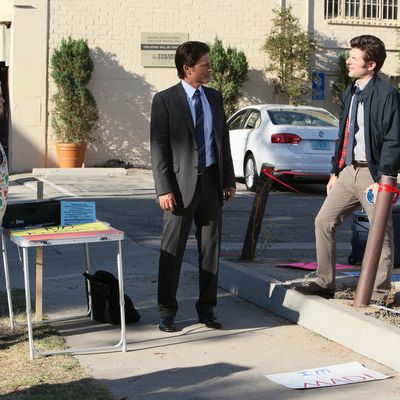
Twenty-two episodes a year is a lot of episodes (here seems as good a place as any to remind that the revered original U.K. iteration of The Office┬áran thirteen, total), and of Parks and RecreationÔÇÖs many impressive qualities is its total control over that pacing and scope. The show has an uncanny instinct for knowing how long is too long for a subplot arc, for knowing how far is too far for a character tic, and just in general, for knowing when it needs a proper story to push things along and when the established ecosystem and relationships are enough. Showrunner Michael Schur is very much on the record as far as what he learned about writing from Cheers, and itÔÇÖs hard to think of another comedy thatÔÇÖs used those lessons so well.
Which is to say, more than a third of the way through its fourth season, Parks actually may be beating Cheers at its own game, not that anyoneÔÇÖs keeping score. Possibly owing to the dearth of other potential couplings among the barflies, the Sam-Diane and Sam-Rebecca will-they-or-wonÔÇÖt-they stories stretched, maybe past their breaking points. In contrast, the two main intraoffice relationships in the Pawnee parks and recreation department were handled relatively economically. (The minute shenanigans start to get pulled with April and Andy, weÔÇÖll know the barrelÔÇÖs empty and we can all begin our mutiny.)
But the main obstacle placed in front of Ben and Leslie ÔÇö that their relationship would threaten her city council candidacy ÔÇö has always felt, and this is no slight, as this is a sitcom, a bit sitcommy: Two compatible, hugely appealing and sympathetic characters who want nothing more than to be together, but canÔÇÖt ÔÇö thereÔÇÖs a lot of comic material to be drawn from that. Eight episodesÔÇÖ worth, to be exact. BenÔÇÖs breaking point came in the form of a good cry while wearing a Batman costume. LeslieÔÇÖs came in the form of a failed attempt to complicate turning a .00003 square-mile parcel of dirt into the Smallest Park in Indiana just to prolong her working relationship with Ben. (Even the public forum crazies have no problem with this, as long as the park isnÔÇÖt used for basketball.) But once both those breaking points pass, logic ÔÇö real-world logic, not sitcom logic ÔÇö would dictate that these two people would just be together anyway and deal with the consequences if and when they come. Skipping ahead a bit here, but the confrontation between Ben and Leslie at the completed Smallest Park works so, so well not only because itÔÇÖs exquisitely acted, but because it deeply resembles the way two people in that circumstance might actually act. The funny canÔÇÖt work if that part doesnÔÇÖt. So donÔÇÖt be embarrassed if you teared up a little bit right there; that was just your eyesÔÇÖ way of telling you they were observing some skilled craftsmanship. YouÔÇÖre fine.
As for the rest of the episode, it was gloriously uneventful. Andy shops around for a community-college class (has he considered Greendale?), and April is his Willem Dafoe to RonÔÇÖs Tom Berenger; she wants him to go for the easy A in Guitar for Beginners, while Ron wants his young son-surrogate to challenge himself, ultimately choosing womenÔÇÖs lasers. Sorry, womenÔÇÖs studies. (ÔÇ£Of all my co-workers, he is one of a select few I find myself not actively rooting against. There I go, getting all sappy.ÔÇØ You canÔÇÖt fool us, Ron Swanson, weÔÇÖve seen you be slyly supportive and nurturing to all of your co-workers, save Jerry. And probably Donna. And also, this is bound to pop up in the comments, but: ÔÇ£For what itÔÇÖs worth, I think you would make an incredible brunette. Ron Swanson.ÔÇØ Any single people who donÔÇÖt try that line, you have no hope.)
Even Tom and Jerry (hey, wait a minute  ) teaming up to redesign the parks departments font, apparently replacing the one NBCs graphics department came up with, seems throwaway enough until it winds up perfectly, and unexpectedly, capping the Entertainment 7Wenty arc. Just when youre rolling your eyes at the Sopranos/Apple store gags, Toms idea to base an entire campaign around the font from Jerrys old I.D. card not only believably pays off Toms pop-culture savvy in a way that isnt just a punch line for once, it also addresses his fear that hes doomed to rot in a small-town government job and go home every night to a beautiful family he loves. Tom is so Aziz that its easy to forget theres a character under there  why would someone like that even stay in a place like Pawnee? Because hes scared shitless of being anything but a big fish in a small pond and needs a little success on his own terms to get his actual confidence to match what he projects. We didnt even realize how much we needed to see this breakthrough until it happened, and thats as much a testament to the shows pacing as any crackerjack line of dialogue.

